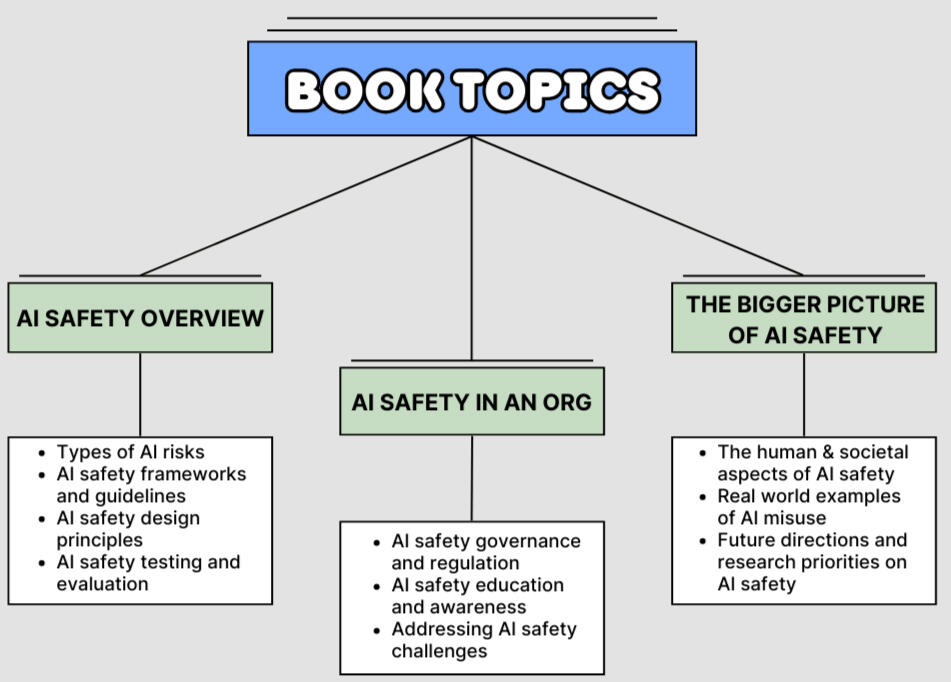AI Safety
A business/AI/data book from
Zacharias Voulgaris, PhD & Arnoud Engelfriet
via Technics Publications
Overview
Artificial Intelligence is transforming our world—but can we trust it to be safe, ethical, and aligned with human values?

Embark on an exploration of AI’s vast potential and the critical safeguards needed to ensure its responsible development. This book cuts through the noise of sensationalist fears and unchecked optimism, offering a grounded, evidence-based approach to AI safety that is essential for professionals, policymakers, and anyone interested in the future of technology.With AI now deeply embedded in decision-making processes—from hiring and healthcare to finance and national security—understanding its risks is no longer optional. This book provides a clear, structured framework to navigate AI safety concerns, covering key topics such as preventing algorithmic bias, ensuring data integrity, mitigating unintended consequences, and aligning AI systems with human ethics and values.Going beyond theory, AI Safety delivers practical strategies for individuals and organizations looking to implement AI responsibly. Readers will discover tested methodologies for building transparent, accountable AI models, strengthening regulatory compliance, and fostering human-AI collaboration in ways that enhance rather than endanger society.For business leaders, data professionals, and policymakers, this book offers indispensable guidance on creating AI systems that are not only innovative but also secure and aligned with legal and ethical standards. Learn how global frameworks, including the EU AI Act and IEEE Ethically Aligned Design, are shaping the AI landscape and what steps organizations must take to remain compliant.Through real-world case studies, AI Safety exposes the potential dangers of AI misuse—ranging from deepfake deception to AI-driven surveillance—and illustrates how robust safety measures can prevent these threats from becoming existential crises. Readers will gain insight into the legal, societal, and technical dimensions of AI governance, ensuring they remain ahead of the curve in this rapidly evolving field.A key takeaway from this book is the importance of designing AI with fairness, non-discrimination, and human oversight at its core. Readers will learn how to identify AI biases, develop more transparent decision-making processes, and implement robust monitoring systems that continually assess and improve AI performance.Whether you are an AI researcher, technology policymaker, or simply someone who interacts with AI systems daily, this book empowers you with the knowledge to contribute to a future where AI is a force for good—one that serves, rather than threatens, humanity.Join the growing movement advocating for responsible AI by equipping yourself with the insights and strategies found in AI Safety. The future of artificial intelligence is still being written—make sure your role in it is an informed and proactive one.
Sample
Links
You can purchase the book in the following places:
* On the publisher's site (use code TP25 to get a 25% discount!)
* Amazon
Or if you just want to explore the authors' other content, you can look into the Foxy Data Science substack (English) or the Ius Mentis blog (Dutch)
Bonus
As a companion to this manuscript, you are entitled to a bonus spreadsheet that contains some key questions about the topic, along with some short answers to them. This can be a useful reference document for when you need a quick answer on AI Safety related matters. The document also provides references to the book, so that you can jump to the relevant section directly and learn more about the particular topic of interest. There are 40 different questions in this document, covering almost all of the AI Safety topics explored in the book. The answers are memorable and easy to comprehend, even if you haven't delved into this topic.
To get this XLSX document, send us proof of your purchase of the book (e.g., your order confirmation document), either from the publisher or Amazon. Be sure to include your email address as part of the filename of that document (e.g., zack(at)myemail.com) We do not use your email address for any other purpose beyond sending you the bonus document.

























